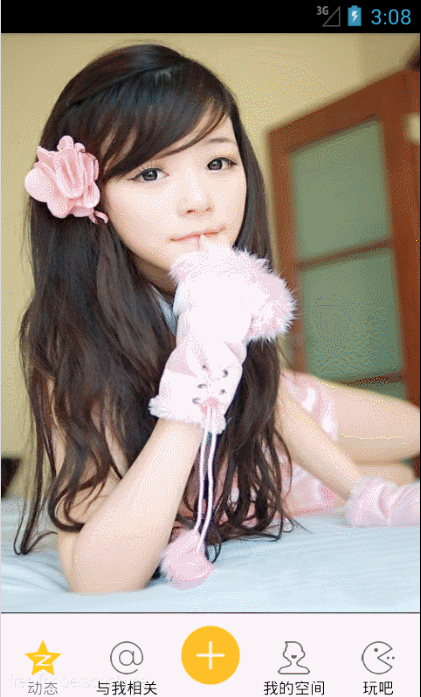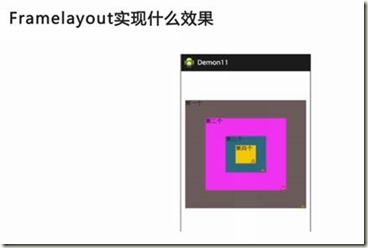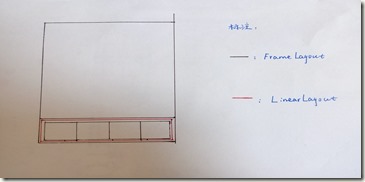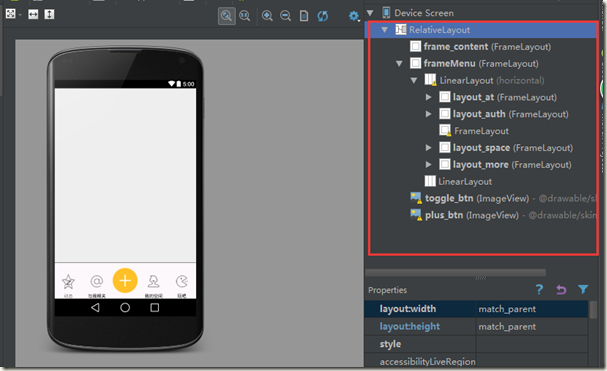android布局学习-使用FrameLayout和LinearLayout制作QQ空间底部导航栏
【声明:本博客通过学习“J灬叶小超 ”博客而写,链接:http://www.cnblogs.com/yc-755909659/p/4288260.html】
--------------------------------------------------------------------------------------------------------
界面效果如下所示:

-------------------------------------------------------------------------------------------------------------
【分析】
此导航栏的设计通过FrameLayout和LinearLayout编写,我们知道每个FrameLayout都是具有叠加效果: (通过图片可以进一步理解)
(通过图片可以进一步理解)
对这个分析,小编花了一个图:

-------------------------------------------------------------------------------------------------------------
【代码】
<RelativeLayout xmlns:android="http://schemas.android.com/apk/res/android"
xmlns:tools="http://schemas.android.com/tools"
android:layout_width="match_parent"
android:layout_height="match_parent"> <FrameLayout
android:id="@+id/frame_content"
android:layout_width="match_parent"
android:layout_height="match_parent"
android:layout_above="@+id/frameMenu"
android:layout_alignParentTop="true">
</FrameLayout> <FrameLayout
android:id="@+id/frameMenu"
android:layout_width="match_parent"
android:layout_height="wrap_content"
android:layout_alignParentBottom="true" >
<LinearLayout
android:layout_width="match_parent"
android:layout_height="match_parent"
android:background="@color/skin_tabbar_bg"
android:orientation="horizontal">
<!--动态-->
<FrameLayout
android:id="@+id/layout_at"
android:layout_width="fill_parent"
android:layout_height="wrap_content"
android:layout_weight="1">
<ImageView
android:id="@+id/image_at"
android:layout_width="wrap_content"
android:layout_height="wrap_content"
android:layout_gravity="top|center"
android:background="@drawable/skin_tabbar_icon_auth_select"/>
<TextView
android:layout_width="wrap_content"
android:layout_height="wrap_content"
android:layout_gravity="bottom|center"
android:text="@string/skin_tabbar_icon_auth"
android:textSize="12sp"/>
</FrameLayout>
<!-- 与我相关 --> <FrameLayout
android:id="@+id/layout_auth"
android:layout_width="fill_parent"
android:layout_height="wrap_content"
android:layout_weight="1" > <ImageView
android:id="@+id/image_auth"
android:layout_width="wrap_content"
android:layout_height="wrap_content"
android:layout_gravity="top|center"
android:src="@drawable/skin_tabbar_icon_at_select" />
<TextView
android:layout_width="wrap_content"
android:layout_height="wrap_content"
android:layout_gravity="bottom|center"
android:text="@string/skin_tabbar_icon_at"
android:textColor="@android:color/black"
android:textSize="12sp" />
</FrameLayout>
<!-- 留白 --> <FrameLayout
android:layout_width="fill_parent"
android:layout_height="wrap_content"
android:layout_weight="1" >
</FrameLayout>
<!-- 我的空间 --> <FrameLayout
android:id="@+id/layout_space"
android:layout_width="fill_parent"
android:layout_height="wrap_content"
android:layout_weight="1" > <ImageView
android:id="@+id/image_space"
android:layout_width="wrap_content"
android:layout_height="wrap_content"
android:layout_gravity="top|center"
android:src="@drawable/skin_tabbar_icon_space_select" /> <TextView
android:layout_width="wrap_content"
android:layout_height="wrap_content"
android:layout_gravity="bottom|center"
android:text="@string/skin_tabbar_icon_space"
android:textColor="@android:color/black"
android:textSize="12sp" />
</FrameLayout> <!-- 玩吧 --> <FrameLayout
android:id="@+id/layout_more"
android:layout_width="fill_parent"
android:layout_height="wrap_content"
android:layout_weight="1" > <ImageView
android:id="@+id/image_more"
android:layout_width="wrap_content"
android:layout_height="wrap_content"
android:layout_gravity="top|center"
android:src="@drawable/skin_tabbar_icon_more_select" /> <TextView
android:layout_width="wrap_content"
android:layout_height="wrap_content"
android:layout_gravity="bottom|center"
android:text="@string/skin_tabbar_icon_more"
android:textColor="@android:color/black"
android:textSize="12sp" />
</FrameLayout>
</LinearLayout>
<LinearLayout
android:layout_width="match_parent"
android:layout_height="1px"
android:background="@android:color/black" >
</LinearLayout>
</FrameLayout>
<!-- 中间按钮背景 --> <ImageView
android:id="@+id/toggle_btn"
android:layout_width="wrap_content"
android:layout_height="wrap_content"
android:layout_alignParentBottom="true"
android:layout_alignTop="@+id/frameMenu"
android:layout_centerInParent="true"
android:src="@drawable/skin_tabbar_btn"/> <!-- 中间按钮 --> <ImageView
android:id="@+id/plus_btn"
android:layout_width="wrap_content"
android:layout_height="wrap_content"
android:layout_alignParentBottom="true"
android:layout_alignTop="@+id/frameMenu"
android:layout_centerInParent="true"
android:src="@drawable/skin_tabbar_icon_select" /> </RelativeLayout>
【结构图】

【分析】
Q1:布局分析:页面中创建两个FrameLayout,frame_content用于存放图片资源,frameMenu用于存放菜单信息
Q2:菜单分析:菜单的框架采用LinearLayout,这个LinearLayout的基础为FrameLayout,菜单项采用FrameLayout,依次创建了5个
Q3:中间(橘黄色)按钮分析:中间的图片在FrameLayout之外,所以不受FrameLayout的限制,故可以通过布局的方向来设定这两个图片的位置
Q4:菜单项的水平分割线:由于分割线隶属于FrameLayout,所以它的位置应该从左上角开始
android布局学习-使用FrameLayout和LinearLayout制作QQ空间底部导航栏的更多相关文章
- Android 布局学习之——Layout(布局)具体解释二(常见布局和布局參数)
[Android布局学习系列] 1.Android 布局学习之--Layout(布局)具体解释一 2.Android 布局学习之--Layout(布局)具体解释二(常见布局和布局參数) ...
- Android布局学习——android:gravity和android:layout_gravity的区别
[Android布局学习系列] 1.Android 布局学习之——Layout(布局)详解一 2.Android 布局学习之——Layout(布局)详解二(常见布局和布局参数) 3.And ...
- Android 布局学习之——Layout(布局)详解二(常见布局和布局参数)
[Android布局学习系列] 1.Android 布局学习之——Layout(布局)详解一 2.Android 布局学习之——Layout(布局)详解二(常见布局和布局参数) 3.And ...
- Android底部导航栏——FrameLayout + RadioGroup
原创文章,转载请注明出处http://www.cnblogs.com/baipengzhan/p/6285881.html Android底部导航栏有多种实现方式,本文详细介绍FrameLayout ...
- Android学习笔记- Fragment实例 底部导航栏的实现
1.要实现的效果图以及工程目录结构: 先看看效果图吧: 接着看看我们的工程的目录结构: 2.实现流程: Step 1:写下底部选项的一些资源文件 我们从图上可以看到,我们底部的每一项点击的时候都有不同 ...
- Android UI-仿微信底部导航栏布局
现在App基本的标配除了侧滑菜单,还有一个就是底部导航栏,常见的聊天工具QQ,微信,购物App都有底部导航栏,用户可以随便切换看不同的内容,说是情怀也好,用户体验也罢.我们开发的主要的还是讲的是如何如 ...
- Android之RadioGroup+ViewPager制作的底部导航栏
在日常开发中我们常常会用到类似微信或者QQ的底部导航.实现这样的效果有多种,今天就为大家介绍一种实现简单,可控性好的底部导航的实现方法. 首先创建activity_main.xml布局文件,里面主要由 ...
- AndroidStudio制作底部导航栏以及用Fragment实现切换功能
前言 大家好,给大家带来AndroidStudio制作底部导航栏以及用Fragment实现切换功能的概述,希望你们喜欢 学习目标 AndroidStudio制作底部导航栏以及用Fragment实现切换 ...
- Android应用底部导航栏(选项卡)实例
现在很多android的应用都采用底部导航栏的功能,这样可以使得用户在使用过程中随意切换不同的页面,现在我采用TabHost组件来自定义一个底部的导航栏的功能. 我们先看下该demo实例的框架图: 其 ...
随机推荐
- codevs 2606 约数和问题
题目描述 Description Smart最近沉迷于对约数的研究中. 对于一个数X,函数f(X)表示X所有约数的和.例如:f(6)=1+2+3+6=12.对于一个X,Smart可以很快的算出f(X) ...
- mongodb分布式查询
分布式查询:mongodb的分布式模型分为replica set和sharded cluster. sharded集群中将read根据sharding key(分片键)转发到指定的shard节点,re ...
- 翻译qmake文档(三) Creating Project Files
翻译qmake文档 目录 原英文文档:http://qt-project.org/doc/qt-5/qmake-project-files.html 创建项目文件 项目文件包含qmake构建你 ...
- C/C++实践笔记 003
数据结构与算法程序=数据结构+算法语言是一种工具语言工具(c,c++)--程序设计方法(面向过程.面向对象)——数据结构(二叉树.队列.栈.红黑树.链表……)——算法(快速排序算法.冒泡排序算法.选择 ...
- .NET MVC HtmlHepler
一.HtmlHepler 1.ActionLink() 动态生成 超链接:根据路由规则,生成对应的 html 代码. //1.注册路由信息 routes.MapRoute( name: "D ...
- Hadoop简单安装配置
Hadoop开始设计以Linux平台为运行目标,所以这里推荐在Linux发行版比如Ubuntu进行安装,目前已经有Hadoop for Windows出来,大家自行搜下文章. Hadoop运行模式分为 ...
- 如何批量删除虚拟机及其关联的存储(Windows Azure)
可以通过运行附件中PowerShell脚本文件RemoveVMandDisk.ps1批量删除VM和Disk,详细代码如下: param($serviceName) echo "Startin ...
- [【codechefCHSEQ22】Chef and Favourite Sequence(并查集)
题目:http://hzwer.com/3419.html 题意:给你一个全是0的数列,有m种操作[Li,Ri],每次操作就将下标处于[Li,Ri]的元素取反.你可以选若干个操作来使这个数列最后变成别 ...
- Webservice学习
参考博客1: http://www.cnblogs.com/lzhp/archive/2013/01/13/2858559.html 参考博客2:http://blog.csdn.net/shilei ...
- background-image 和 img
一:解决div里面的img图像宽度不变,高度不变! 超出div部分设置隐藏! 图片:1920x526 div容器: 1423x526 1. background-image:样式实现 img: 标 ...
